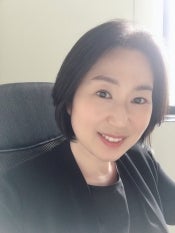New K-pop and Korean film classes launch at ASU

KOR/SIC 415: Korean Popular Culture, which will return in spring 2025, explored the intricacies of K-pop. Photo courtesy Areum Jeong
The Hallyu, or “Korean wave,” has made its way into Arizona State University classrooms with the arrival of a new professor who is using her own fandom and expertise to educate students on Korean culture, literature, music and film.
Areum Jeong, an assistant professor in the School of International Letters and Cultures in The College of Liberal Arts and Sciences, never anticipated her love for Korean pop culture would evolve into a successful career.
“K-pop and Korean film are just a very natural part of my daily life,” Jeong said. “To me, it's as natural as eating or sleeping. But there was a need, a gap in literature, to examine K-pop fans and their labor more closely, specifically K-pop fans in Korea.”
And who better to fill the gap than a superfan?
When she stumbled upon the job posting related to Korean culture and literature at ASU, she felt it was a perfect fit. “I was very excited because I could see where I could contribute with research and my teaching, and I could help the (Korean) program grow.”
Jeong’s research largely looks at Korean film, popular culture, theater and performance. She is currently working on a book exploring how the labor of K-pop fans is not only shaping the industry's global popularity, but also K-pop’s cultural and social impacts.
“The School of International Letters and Cultures prides itself on its breadth, from teaching languages and cultures to subjects as old as the Hebrew Bible, Caesar and the Quran, or as new as soccer, anime and the latest international films,” said Mike Tueller, the school’s director. “Professor Jeong opens a new gateway into a fascinating culture, and I'm excited to have her here at ASU.”
Over the past decade, Hallyu, or the growing influence of Korean culture around the world, has become more evident in all forms of media. “I noticed that after BTS’s explosive popularity, there were a lot more students who were interested in studying Korean pop culture,” Jeong said.
In 2023, Netflix announced it would invest $2.5 billion to create Korean films and shows for its platform. And in the same year, 19 of the top 20 selling albums were by K-pop groups, according to the International Federation of the Phonographic Industry.
Recognizing the high educational value in offering students more opportunities to learn about diverse cultures and comparative viewpoints, Jeong introduced two new courses.
This spring, she launched KOR/SIC 415: Korean Popular Culture, which had an emphasis on K-pop. In the fall, KOR 394/SLC 394: Korean Film Directors, will focus on three prominent film directors.
Video courtesy The College of Liberal Arts and Sciences
“The class has been so incredibly informative and fun,” said animation senior Cheryl Brangaccio, who fell in love with BTS in 2016.
The class, which will return in spring 2025, explored the history of Korean pop culture and its evolution from the 90s to today. Students also learned to examine the industry's new social impacts related to politics, gender, race and sexuality.
“I think anyone can find something to enjoy in the class, regardless of their view on what K-pop is and how their fans are. I haven't had so much fun in a humanities class until now, and had a chance to make new friends,” Brangaccio said.
Now, Jeong is excited for her fall course on Bong Joon-ho, Kim Jee-woon and Park Chan-wook.
“I view them as the pillars of new Korean cinema,” Jeong said. “Their craft is what helped develop Korean film into what it looks like today.”
However, the coursework is very male dominated because “there are very little opportunities for women filmmakers in Korea to climb up the ladder,” she explained. But Jeong is hopeful that the film industry will evolve to be more inclusive of women.
“I want students to see how the idea of Korean-ness is not some kind of fixed, unchanging idea, but rather it's always shifting, just like K-pop. It's always changing to reflect economic and cultural values,” Jeong said.
More Arts, humanities and education

ASU alum's humanities background led to fulfilling job with the governor's office
As a student, Arizona State University alumna Sambo Dul was a triple major in Spanish, political science and economics. After graduating, she leveraged the skills she cultivated in college —…

ASU English professor directs new Native play 'Antíkoni'
Over the last three years, Madeline Sayet toured the United States to tell her story in the autobiographical solo-performance play “Where We Belong.” Now, the clinical associate professor in…

ASU student finds connection to his family's history in dance archives
First-year graduate student Garrett Keeto was visiting the Cross-Cultural Dance Resources Collections at Arizona State University as part of a course project when he discovered something unexpected:…
